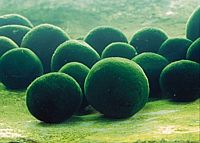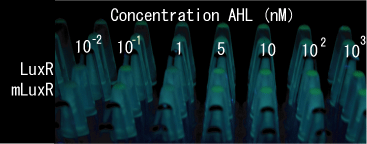Chiba
From 2007.igem.org
m (→Project Overview) |
|||
| (One intermediate revision not shown) | |||
| Line 83: | Line 83: | ||
[[Chiba/Goal| See Details]] | [[Chiba/Goal| See Details]] | ||
| - | ===[[Chiba/Goal# | + | ===[[Chiba/Goal#In the Long Run|In the Long Run]]=== |
| - | See [[Chiba/Goal# | + | See [[Chiba/Goal#In the Long Run|here]] : our brainstorming of the marimo future! |
[[Chiba/Goal|more...]] | [[Chiba/Goal|more...]] | ||
| + | |||
| + | ==Sponsers== | ||
| + | <center> | ||
| + | [[Image:Chiba_Knowledge.jpg]] | ||
| + | [[Image:Chiba_yakukensha.gif]] | ||
| + | [[Image:Chiba_Stratagene.gif]] | ||
| + | [[Image:Chiba_Greiner.gif]]<br><br> | ||
| + | [[Image:Chiba-u.gif]] | ||
| + | </center> | ||
Latest revision as of 06:44, 27 October 2007
|
Home |
Project Overview
Our iGEM project is to make a Marimo-ish gathering of bacteria. Marimo is a green spherical shaped algae (shown in Fig.1), which is a popular living organism in Japan as a National Treasure because of its beautiful shape and its smoothness.Introduction: Why We Make a Marimo
Spherical Multicellular Organism!?
When you see a shape in Nature, you will notice whether a sphere, which is absolutely symmetric in 3D, is really stable or not in Nature. In fact, an oil droplet is a sphere in water. Red blood cell in a hypotonic solution shows its shape change to a spherical balloon. However multicellular organisms have their shape different from a sphere except Marimo. Of course, other algae do not show spherical shape, they live on a surface of stone. It is quite intriguing how Marimo remains its spherical shape in a lake!
Our team focuses understanding how such spherical structure can be sustained even when it Is multicellular organisms.
more...
Project Design: How To Make Our Marimo
What we require to our system is as follows:- Affinity Tag.
- Communication Module.
- Size Control.
Two cells are used in our system: AHL senders and receivers. Senders generates the affinity tags constitutively, while receivers generates them only when they are induced by AHL. The marimo-forming goes like this:
- Make the sender core by sticking with the affinity tag.
- Insert the sender core into the receiver culture.
- The sender core produces AHL, which make the near receivers to generate the affinity tags and GFPs.
- The affinity tagged receiver sticks with the central sender core. This will continue until the AHL cannnot reach the marimo boundary,
- When the AHL reached the marimo boundary, the adsorping stops, which makes a finite-sized marimo bacteria.
Experiments Overview
Making Affinity Tags
- Make the affinity tag by inserting the his-tag into the flagellar fillament.
Making Communication Module
- Making Receivers
- Making Senders
Controlling Size
- Improve Sender
- Improve Receiver
- Localize AHL
Making Marimo
Our Goal
Although we could not reach them, below we describe the goal that we set to make a marimo bacteria.
- A test of adsorption between flagella
- A test to confirm a limit of size
- A test to form Marimo
- A test of size control
In the Long Run
See here : our brainstorming of the marimo future!






